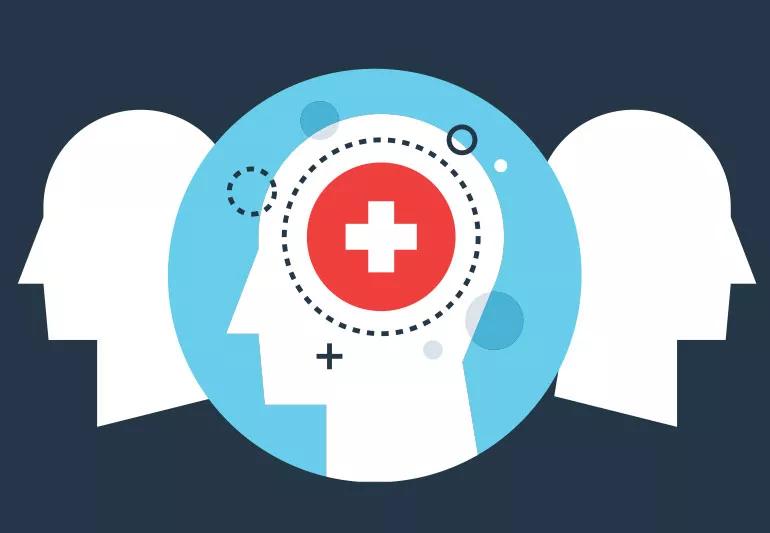Here’s what you need to know if you’re at risk

Image content: This image is available to view online.
View image online (https://assets.clevelandclinic.org/transform/4388410c-d19d-4405-bad3-0682538feb29/mentalHealthFamily-872155820-770x553_jpg)
Illustration of a family member with a mental disorder
If you have a close blood relative living with a mental illness, you might be worried that one is lurking in the recesses of your brain. Or your child’s brain.
Advertisement
Cleveland Clinic is a non-profit academic medical center. Advertising on our site helps support our mission. We do not endorse non-Cleveland Clinic products or services. Policy
Since many people don’t talk openly about mental health disorders, you may not know whether your concern is warranted.
Psychologist Scott Bea, PsyD, sheds some light on this important topic: “Think of mental illness as you would any other family-linked health concern,” he says. “Do your best to become educated about the condition and symptoms so you can be on the lookout.”
One in five adults will experience a mental illness at some point each year. Scientists haven’t (yet) identified a mental illness gene. But there is evidence that if you have a biological family member with a diagnosed mental disorder such as depression and schizophrenia, your likelihood of having one increases.
That doesn’t mean if you have a parent with schizophrenia, you’ll also develop it — or that you’ll develop it with the same severity. Dr. Bea says environmental factors play a starring role in the development of mental illness.
“Since children’s brains are actively developing, childhood experiences — both positive and negative — are huge factors in determining if mental illness will affect you,” he says.
“Through early intervention, we can mold brains and even change the extent to which kids and young adults experience a mental health disorder now or in the future.”
Dr. Bea says 50% of mental health concerns appear by age 13, and 75% appear by age 24. Since brains are thought to be fully developed by age 25, reaching that age without a diagnosed mental health disorder is a good sign.
Advertisement
Because kids’ brains are malleable, Dr. Bea recommends building resiliency to help them deal with the emotions their thoughts cause. You may not be able to ward off a mental health diagnosis entirely, but you can lessen how severely a person will experience it.
He recommends parents or caregivers:
“A mental illness is not always the result of childhood experiences,” says Dr. Bea. “Some people have wonderful home environments and amazing caregivers but still experience a mental health disorder.”
If you are concerned about a child or loved one, talk to a doctor, especially if mental health disorders run in the family. Dr. Bea recommends intervening as quickly as possible.
“Once you have a diagnosis, act quickly, when psychotherapy or medications are most effective,” he says. “If you allow habits to develop, the brain circuits and grooves deepen, and it becomes more challenging to overcome.”
He also reminds us that the brain is the most complicated organ in the body. While we can form and mold it to a certain extent, we don’t have absolute control over it.
“No one should feel bad about having a mental illness,” he says. “Would you feel responsible if your spleen ruptured? You probably wouldn’t, because most bodily processes are beyond our control. We need to think about mental health the same way and erode the stigmas.”
Advertisement

Sign up for our Health Essentials emails for expert guidance on nutrition, fitness, sleep, skin care and more.
Learn more about our editorial process.
Advertisement
Fishing for compliments, provoking conflict and pouring on the melodrama are all ways of expressing an unmet need
By setting boundaries around how much you give, you can save your time and resources while also being a good person
Whether it’s playing hooky or faking cancer, malingering behavior is always motivated by personal gain
Causes range from psychological conditions like PTSD to physical conditions like fibromyalgia
Always putting others’ happiness before your own can build resentment over time
Self-stimulating behaviors are often ways of self-regulating or coping with intense emotions
Both include bouts of depression, but differ in their extremes
Catching and responding to passive-aggressive behavior can be difficult
Prioritize your health by managing stress, strengthening your social connections and getting quality sleep
Bolsters, blankets, pillows and blocks can offer extra support, stability and comfort
Allergies, postnasal drip, asthma or reflux could be to blame for a cough that won’t quit